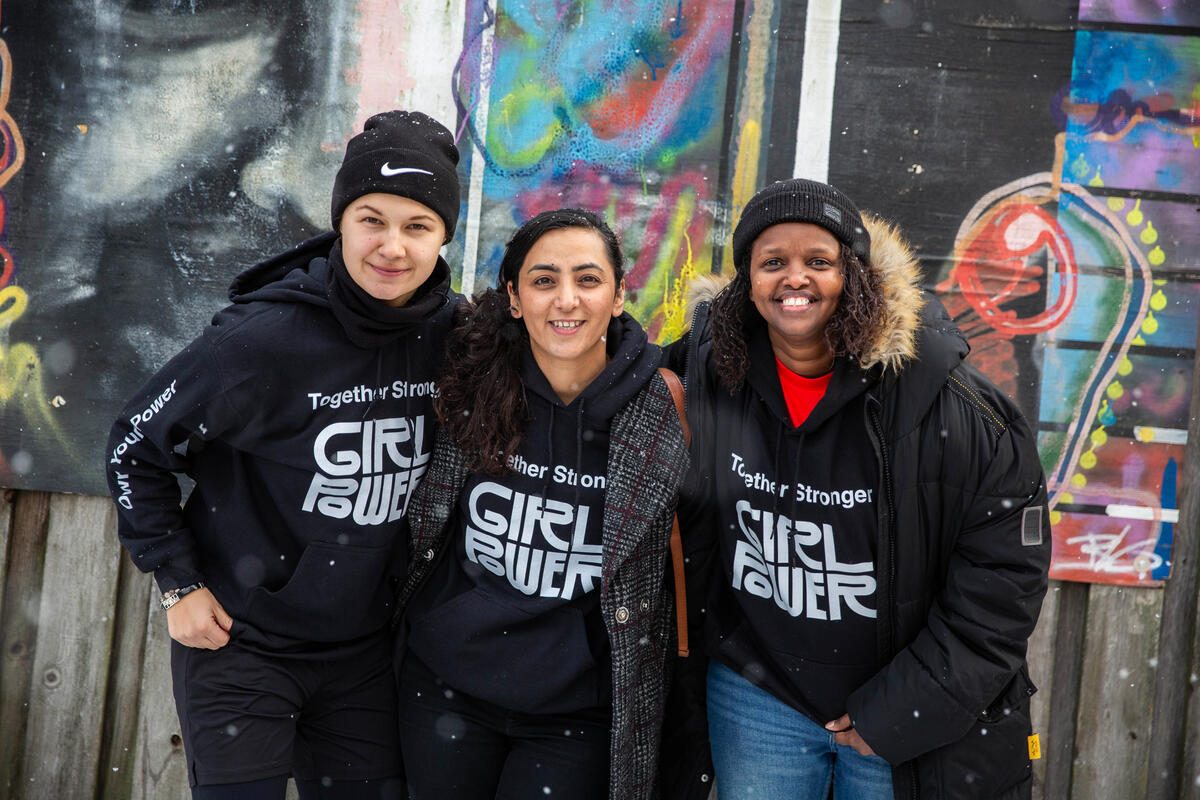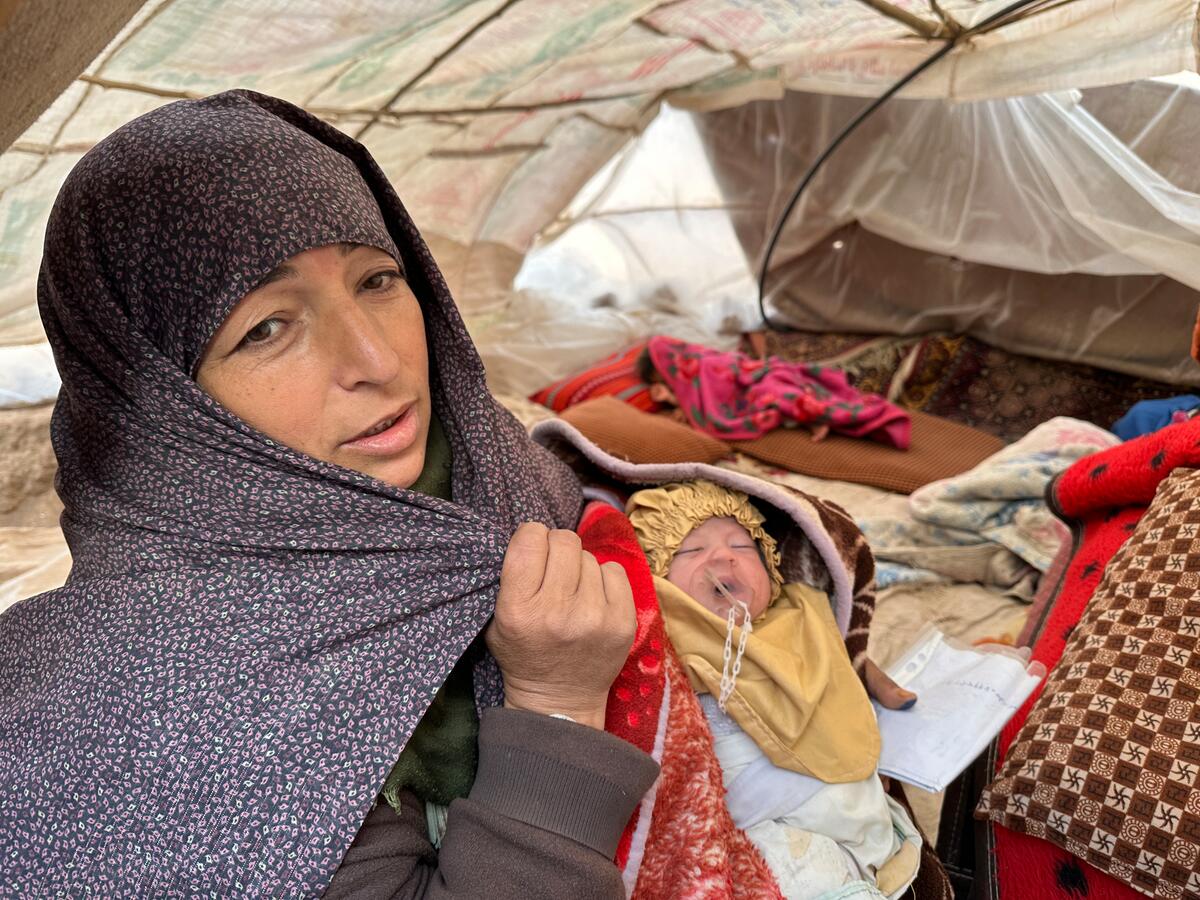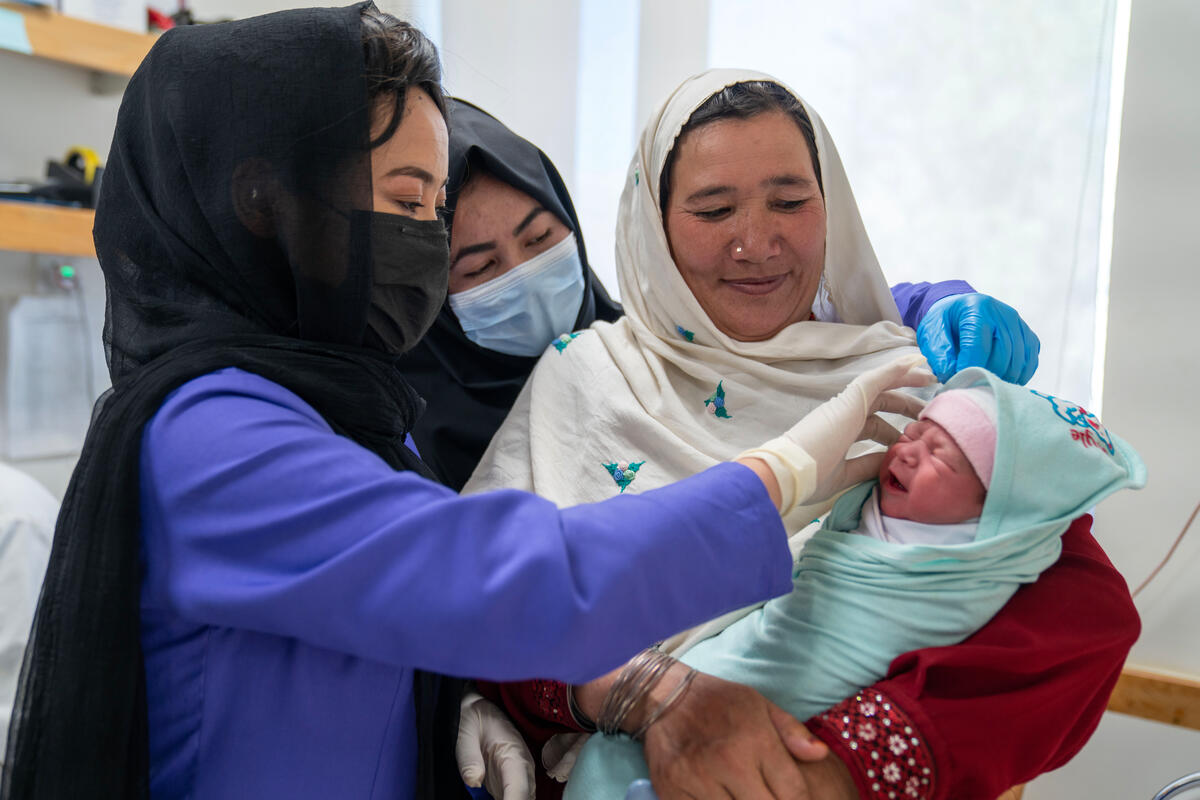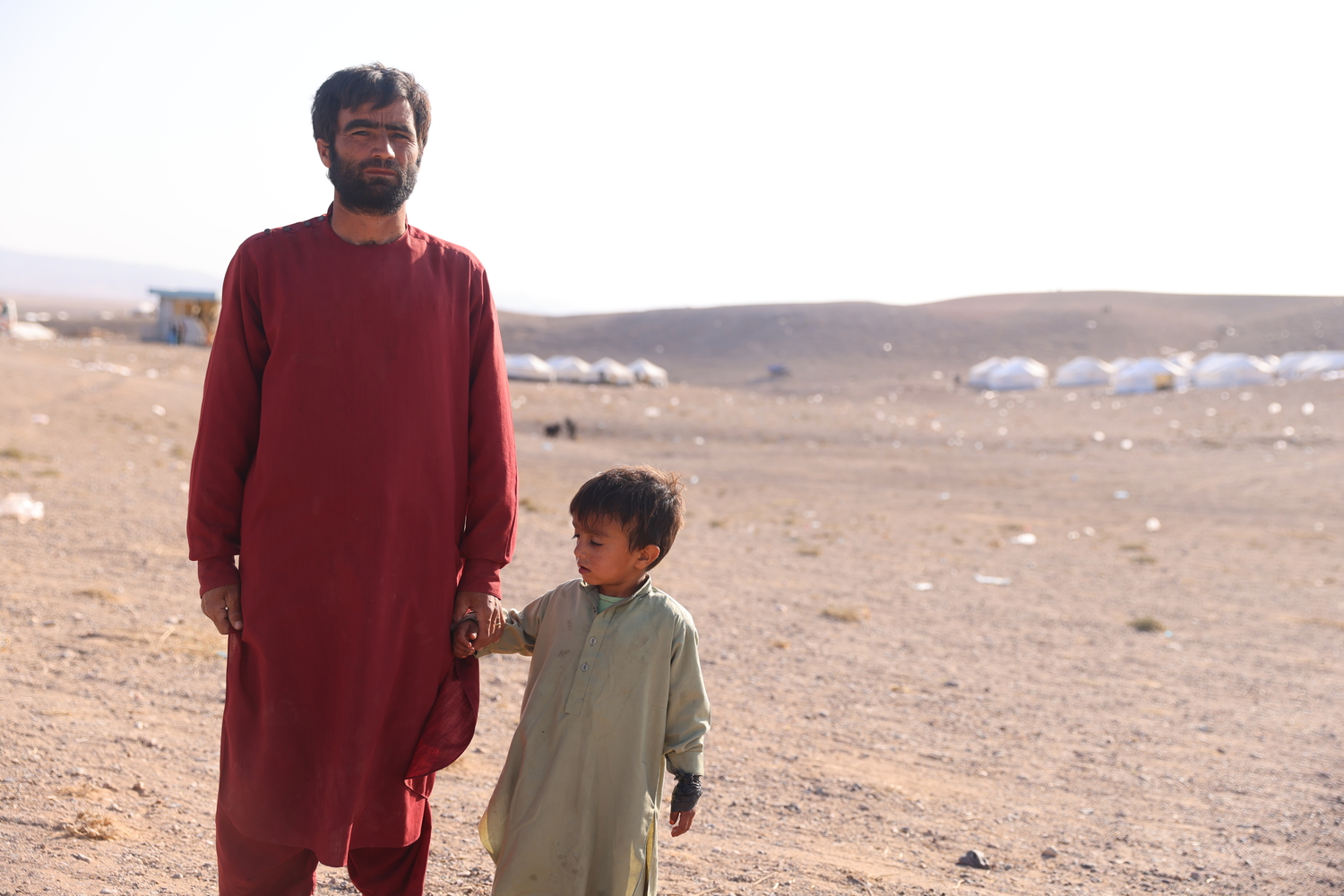Afghanistan Humanitarian Update No. 34
Afghanistan Humanitarian Update No. 34
At a Glance:
- First delivery of UN humanitarian aid from Termez, Uzbekistan, into Northern Afghanistan
- UNHCR prepares to resume activities in Afghanistan
- Situation in Makaki camp in Afghanistan near Iranian border appears calmer
- Trucks loaded for convoy to Herat
- Sharp drop in returns from Iran
- Transfer from Pakistan's Killi Faizo temporary site to Roghani camp resumes
Aid sent from Uzbekistan to Northern Afghanistan
The first aid delivery from Termez in Uzbekistan to Afghanistan arrived today in Hairaton, northern Afghanistan. A barge loaded with 2,000 blankets and one roll of plastic sheeting from UNHCR, winter clothes and jerry cans from UNICEF and flour from WFP crossed the Amudar'ya River. Two other barges carrying WFP food also went across later. The supplies were to be off-loaded on the other side for subsequent distribution to internally displaced people (IDPs) inside Afghanistan.
A UNHCR staff member who crossed to the Hairaton side of the river met with Afghan colleagues from the UNHCR sub-office in Mazar-i-Sharif who advised that the town was generally calm, although pockets of insecurity were reported in some surrounding areas. Extensive looting had, however, occurred at the UNHCR office, with people carting off anything they could remove - down to door and window frames. (In Kabul, a mob ransacked a warehouse used by UNHCR. They are reported to have taken away 1,400 tents and unknown quantities of quilts intended for internally displaced people and returnees.)
The UNHCR staff member in Hairaton was also able to meet with a representative of the Northern Alliance to discuss the provision of humanitarian assistance in the region.
UNHCR prepares to resume activities in Afghanistan
Pending UN security authorization, UNHCR is gearing up to resume its activities inside Afghanistan. In addition to its regular Afghan staff, UNHCR plans to immediately deploy extra emergency staff and re-open its offices in Afghanistan - in locations where it is safe to do so. We have also put together an immediate programme to assist some 100,000 internally displaced people and returnees in Afghanistan. UNHCR will increase stocks in key cross-border locations and pre-position supplies while at the same time keeping up its preparedness in the region in the event of an influx of refugees into the countries neighbouring Afghanistan. We hope to expand our programme in order to deliver the maximum assistance, as more areas become accessible.
Makaki camp reported calmer
Aid workers this morning reported a slight improvement in the situation in Makaki camp for displaced Afghans, just inside Afghanistan near the Iranian border. The camp, which was recently set up by Iranian authorities, was the scene of a tense standoff on Tuesday between Taliban forces and troops of the Northern Alliance pressing to gain control of the site.
NGO staff who visited the camp briefly Wednesday morning said the site seemed to be under the control of the Northern Alliance. They noted that some of the guards who had previously manned the camp under the Taliban were still present, but they said that they were no longer supporting the Taliban.
Humanitarian staff who entered the camp Wednesday said they were warned not to stay because there were still security concerns. Thus, the camp's 6,000 IDPs went for a second day without the presence of humanitarian staff. The NGO staff reported that there were clearly new people in the camp, but it was not clear who was in charge. Although the situation appeared calmer than on Tuesday, they said Makaki was still very tense.
Border monitors were also told that Iranian authorities this morning sent three trucks to the camp to begin the transfer of some of the displaced to Mile 46, another IDP camp 50 kms to the south. The trucks were expected to move some of those who had been living in makeshift shelters on the outskirts of Makaki - up to 3,000 people.
Trucks loaded for convoy to Herat
UNHCR's sub-office in the western Afghanistan town of Herat was re-opened by local staff on Wednesday. Herat was reported calm, with only a few armed people visible on the streets.
Across the border in Iran, 10,000 blankets and 2,000 plastic sheets from UNHCR stocks in the Iranian city of Mashad were being loaded Wednesday onto a joint Iranian Red Crescent Society/UNHCR convoy scheduled for delivery to Herat. There are more than 200,000 displaced Afghans near Herat.
The convoy, which could travel as early as Thursday, will be unloaded and the goods distributed by local UNHCR staff.
Meanwhile, UNHCR staff in Dogharoun, Iran's main border crossing in the north-east, reported that the Afghan border was closed to commercial traffic because of an absence of Afghan border officials. More than 220 commercial trucks were stuck at the border Wednesday morning waiting for it to re-open.
Taliban authorities who had previously handled border formalities in the town of Islam Qala left the frontier on Monday afternoon following news of the fall of Herat. Since then, no commercial trucks have been able to enter Afghanistan.
Sharp drop in returns from Iran
A significant drop in the number of returns through Dogharoun was reported Wednesday, with some 376 Afghans going home. This is a substantial drop from a daily average of more than 800 over the last several weeks. UNHCR staff believe that many Afghans now prefer to wait and see how the situation inside Afghanistan evolves. Some returnees, however, said the drop in numbers was possibly because Afghans in Iran were no longer worried about the safety of their families in Afghanistan and preferred to stay in Iran, where some of them are able to work.
Transfer from Killi Faizo site in Pakistan resumes
In Pakistan, UNHCR on Wednesday resumed relocating Afghan refugees from the Killi Faizo temporary staging site near the Chaman border crossing to Roghani camp, further inland from the border. The transfer was interrupted for one day, Tuesday, when authorities objected to the pace of the relocation operation.
Over the coming days, aid workers plan to relocate all the refugees in the exposed Killi Faizo encampment to Roghani. The site at Killi Faizo will be maintained at a much smaller size to temporarily shelter any desperate, newly arriving Afghans before they can be shifted further inland to Roghani and other camps in Baluchistan Province's frontier region.
A total of 484 people moved from Killi Faizo to Roghani aboard three convoys on Wednesday. By the end of the day, the number of Afghans in Roghani had thus risen to over 1,100 people. Roghani could eventually shelter up to 40,000 people.
Outside the Killi Faizo transit camp on Tuesday, some 800 Afghans - more than 150 families - spent what was for some their fourth night inside Pakistan's frontier but outside the reach of aid agencies. Pakistan authorities had for days refused to let the Afghans encamped in the open to be pre-registered at the Killi Faizo site.
On Wednesday morning, UNHCR was told that it could shelter the large group in Killi Faizo and staff immediately put them on the roster for relocation to Roghani. Most of these Afghans arrived over the past four days and come from Kandahar, Mazar-i-Sharif, Herat, Helmand and Badghis provinces in Afghanistan.
Including the 800 granted entry during the day, the current number of pre-registered Afghans at Killi Faizo officially stood at some 3,800 people by the end of the day Wednesday.
Nearly 800 Afghans entered Pakistan on Tuesday, mainly arriving from Kandahar, Boldag, Khakaiz and Heart. They indicated that they were bound for Chaman, Quetta and Pishin. Some 95 percent of the Afghans reported crossing into Pakistan were ethnic Pashtuns. The vast majority of those entering Pakistan crossed at Chaman.








